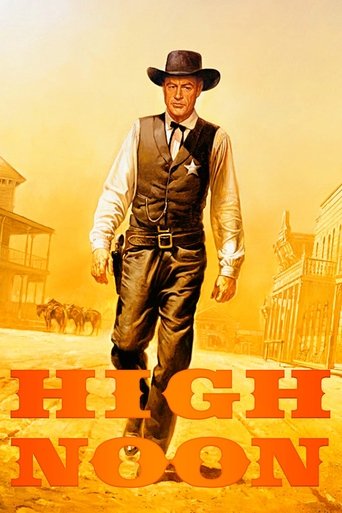The story of a man who was too proud to run!
"High Noon," released in 1952 and produced by Stanley Kramer Productions and United Artists, is a gripping Western that transcends its genre to become a timeless tale of moral courage and individual responsibility. Directed by Fred Zinnemann and set in the small town of Hadleyville, the film follows Marshal Will Kane, portrayed by Gary Cooper, as he faces a moral dilemma on his wedding day. Just as he is about to retire and leave town with his new Quaker bride, Amy (Grace Kelly), Kane learns that Frank Miller, a dangerous outlaw he had previously sent to prison, is arriving on the noon train to seek revenge. Despite the pleas of his townspeople and his own desire for a peaceful life, Kane decides to stay and confront Miller and his gang alone, showcasing the film's central theme of standing up for what is right, even when it means standing alone. The film's real-time narrative, unfolding over the course of 85 minutes leading up to the climactic noon showdown, adds a palpable sense of urgency and tension. Cinematographer Floyd Crosby masterfully captures the stark, sun-drenched streets of Hadleyville, enhancing the film's atmosphere of impending doom. The use of the clock, prominently featured throughout the film, serves as a constant reminder of the inexorable march toward the confrontation, heightening the suspense. The score by Dimitri Tiomkin, with its haunting theme song "Do Not Forsake Me, Oh My Darlin'," complements the film's tension and has become iconic in its own right, winning an Academy Award for Best Original Song. "High Noon" is not just a Western; it is a powerful allegory for the political climate of the early 1950s, often interpreted as a critique of McCarthyism and the Hollywood blacklist. Will Kane's struggle to find support from the townspeople, who are either indifferent or too afraid to help, mirrors the fear and cowardice that pervaded American society during the Red Scare. The film's screenwriter, Carl Foreman, was himself blacklisted and forced to leave the country shortly after the film's release, adding a layer of real-world poignancy to the story. This subtext elevates "High Noon" from a mere genre piece to a profound statement on integrity and the cost of standing up against injustice. Gary Cooper's portrayal of Will Kane earned him an Academy Award for Best Actor, and the film itself won three more Oscars, including Best Film Editing and Best Original Score. Cooper's performance is understated yet powerful, embodying the quiet strength and moral conviction of a man determined to do what is right, regardless of the personal cost. "High Noon" remains a landmark film, not only for its thrilling narrative and technical achievements but also for its enduring message about the importance of personal integrity and the courage to stand alone in the face of overwhelming odds.
Năm:1952
Ngân sách730000$
Thời lượng85 phút
Doanh thu8000000$
Thể loạiPhim Miền TâyPhim Gây Cấn
Các quốc gia sản xuấtUnited States of America
